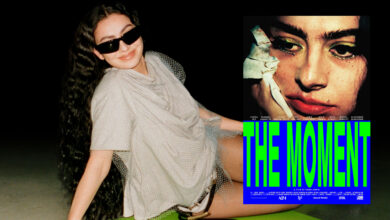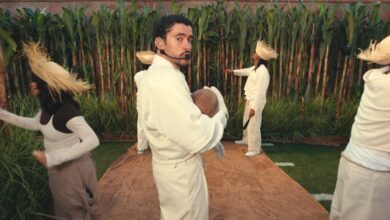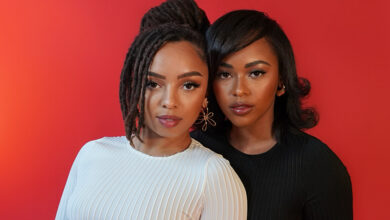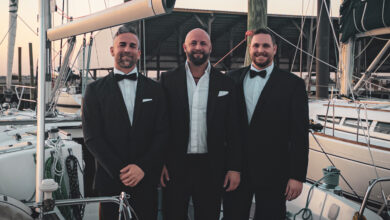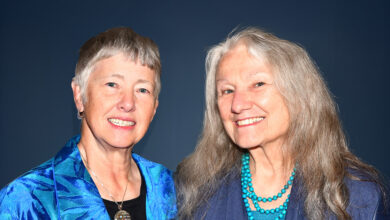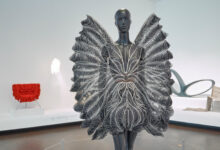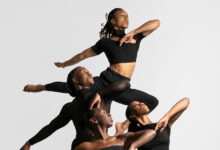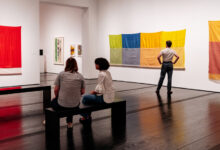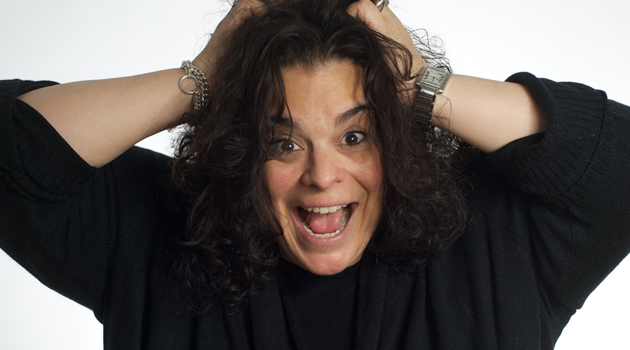
Jessica Kirson, the Woman of Many Faces
Out comedian Jessica Kirson brings her side-splitting standup to Houston.
by David Goldberg
She’s hit Jay Leno, The View, and just about every city, small town, and college in the country. Jessica Kirson, the dynamic comedian of many faces, brings her Jewish upbringing, lesbian identity, and full-bodied power to her standup—and she doesn’t hold back on interviews, either. Kirson spoke with OutSmart in preparation for her show at the University of Houston on March 1.

David Goldberg: As a cross-minority performer, would you say that you need to have a message or an implied meaning in your comedy?
Jessica Kirson: I don’t like being labeled as a type of comedian. I do all kinds of comedy. I’m just trying to be very real and honest and truthful. I try to entertain people as best as I can, because I feel like right now most people don’t like to think a lot. So, I go on and try to have it so that they don’t analyze and think a lot. I love doing characters, and I love putting out a message of tolerance that teaches people not to be mean, and to be more kind.
That’s interesting, because self-deprecation is a big part of your humor.
I wouldn’t be doing comedy if I didn’t have issues with myself. It’s important to talk about how you really feel and how you feel with yourself. I struggle with that and work on it every day—just being happy and content with myself, and being at peace.
Do you think the comedy helps you deal with an issue, or does comedy exacerbate it?
I think comedy helps me a lot. I would be like that if I were doing comedy or not. But it’s like therapy for me. I get to talk about things and analyze what is going on with my life with my comedy.
You’re Jewish. You’re gay. You put your weight in your humor. Do you ever feel marginalized by the media or by your audience?
I struggle with my weight—which most of America does—so that’s incredibly common and people can relate to it. I’m gay, but I don’t talk about it in every set I do. I don’t like being labeled. It’s a part of who I am, but it’s not all of who I am, and, unfortunately, if I talked about it every time I was on TV, I would be completely labeled and put in a certain category. I also don’t always mention that I’m Jewish. I’ve been doing a few colleges where I haven’t even talked about it, because they literally don’t know about Jewish people. They don’t know the culture, and they wouldn’t know what I was talking about. I talk about what I want to talk about, and that’s part of why I love what I do. I don’t like being censored or being expected to talk about anything I don’t want to.
I see that you are performing at the Twin Cities Jewish Festival in the next few months. Do you feel an affiliation to the Jewish or gay communities that makes you take on these types of gigs, or is it just another stop on the tour?
I love performing for Jewish crowds or gay crowds because I can be very open, and there’s a lot of camaraderie and they get it. They get what I’m talking about. It’s more fun for me when I can do that.
Who would you say your fans are?
I think my fans and demographic is everybody except for very old people. [Seniors] are—not all, but a lot are—set in their ways, and it’s a whole different generation. So, with those crowds I often feel censored. Not all, but a lot of older people have this view that a woman should be a certain way, and it’s very different now. Women are a lot more opinionated now, and have a lot more power than they did many years ago.
So you have to get up in front of a crowd in a remote area and not know if your jokes will fly. That must be terrifying.
I wouldn’t use the word terrifying, but it’s definitely more stressful. You definitely get more nervous when you are performing for people that you know are not going to get it as much as other crowds. It’s not as much fun, which gets depressing, because I really have fun 90 percent of the time that I’m on stage.
Who would you say some of your influences are?
Lucille Ball, Carol Burnett, old-timers on Saturday Night Live, and basically any comedian that has had a really successful career and is honest and doesn’t kowtow to what other people think they should do.
You’ve been endorsed by comedians like Joy Behar and Wanda Sykes. Would you say there’s some kind of camaraderie, or a sorority of women in the field now that there are more of you than ever before?
There’s always a camaraderie with female comics and with male comics. It’s a big family kind of thing. There are some female comics who have been amazing to me and very supportive, like Joy and Wanda and Sandra Bernhard and Rosie O’Donnell and Lisa Lampanelli. I think it’s great, because if I ever got to that kind of success I would absolutely help other women. I don’t think it’s great that some female comics who have incredible careers and a ton of power don’t do anything for anyone, when they’ve been in that position. It’s disappointing.
Is it hard to date as a touring public figure?
It’s not easy. It’s a lot of touring and a lot of being on the road, but it’s easier when you are with someone who is healthy and who is very independent and who doesn’t get threatened. It depends on the other person. I’ve been in hard relationships with people who are incredibly jealous and don’t have their own lives. That’s when it gets very hard.
To learn more about Jessica’s upcoming appearances, visit jessicakirson.com.
David Goldberg also writes about authors Timothy Lambert and R.D. Cochrane in this issue of OutSmart magazine.


